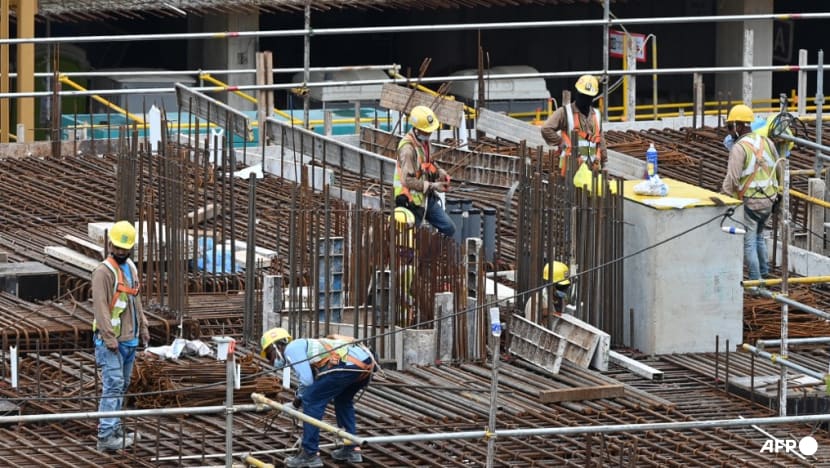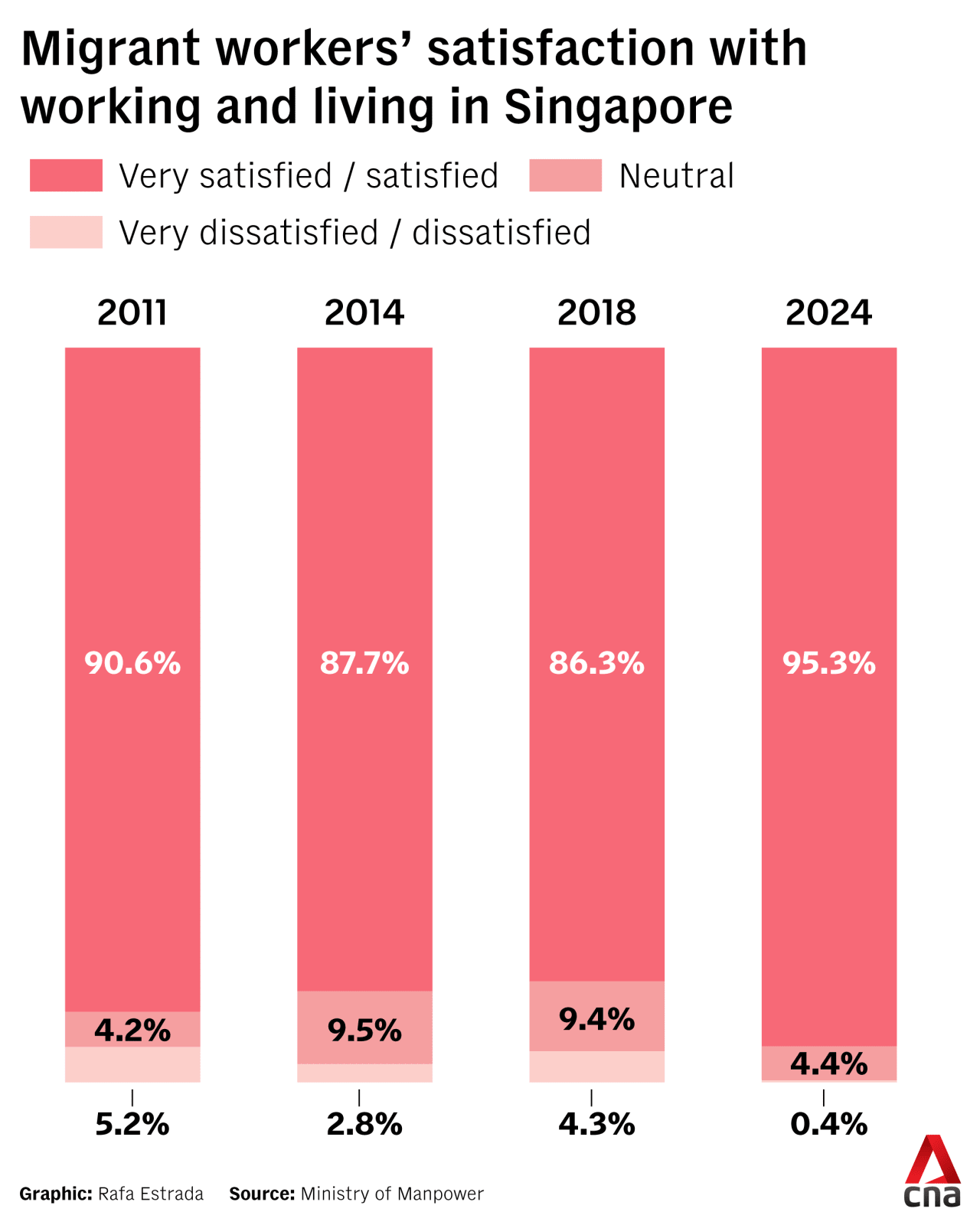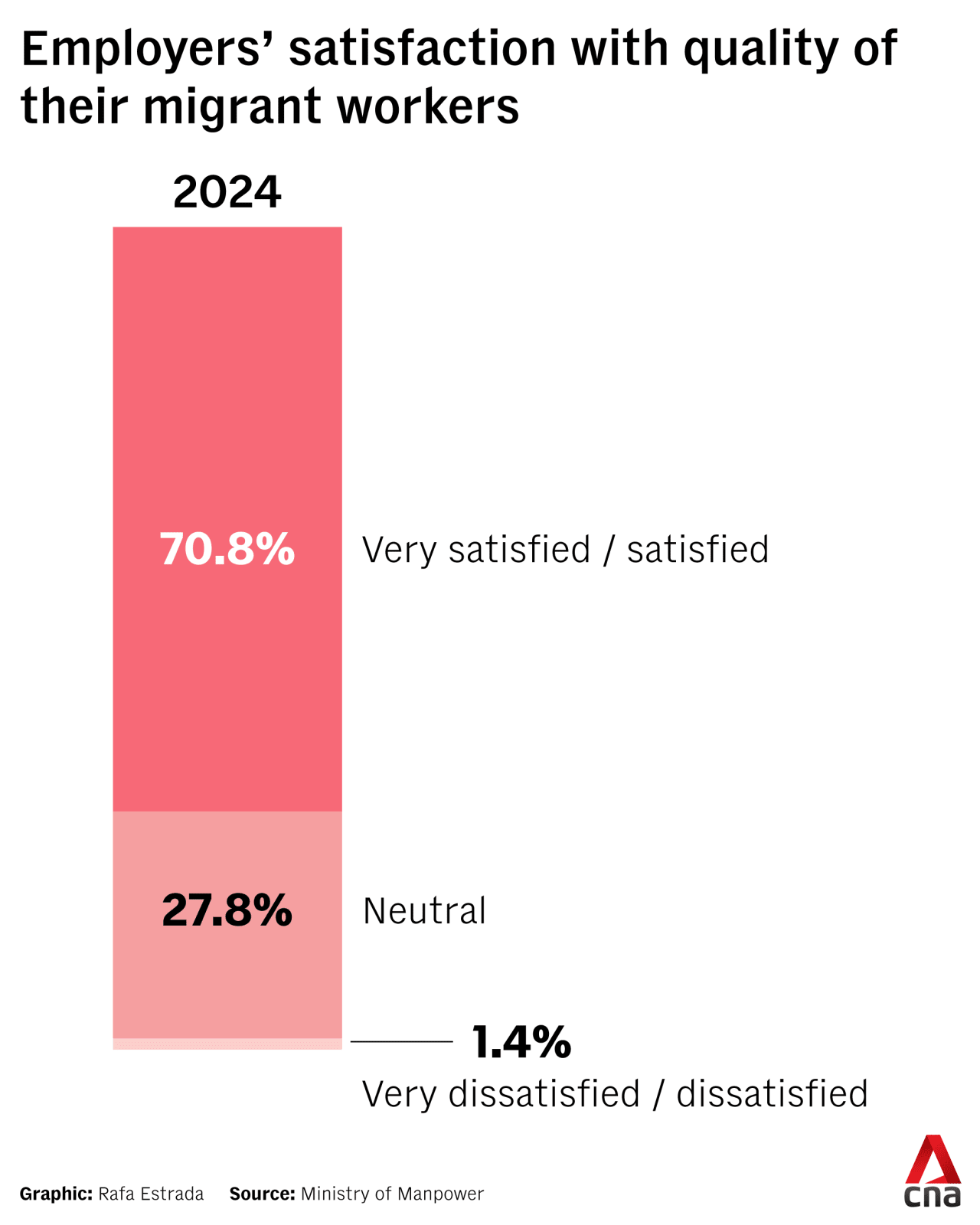Singapore sees highest migrant worker satisfaction; 9 in 10 satisfied with working conditions: MOM survey
Over 90 per cent of migrant workers surveyed last year said they would recommend Singapore as a place to work.

Workers at a construction site in Singapore on Sep 14, 2021. (File photo: AFP/Roslan Rahman)

This audio is generated by an AI tool.
SINGAPORE: More than 95 per cent of migrant workers surveyed by the Ministry of Manpower (MOM) last year were satisfied with their working and living conditions in Singapore.
According to findings from MOM’s Migrant Worker Experience Survey released on Thursday (Aug 21), 95.3 per cent of migrant workers in 2024 reported being satisfied with working and living in Singapore, up from 86.3 per cent in 2018.
This marks the highest satisfaction level recorded since the survey was first conducted in 2011.
Of those surveyed, 96.7 per cent indicated they intend to continue working with their current employer or return to Singapore in the future, up from 91.9 per cent in 2018.
MOM said this reflects continued confidence in Singapore as a preferred destination for work.
“We are encouraged by the high and rising levels of satisfaction among workers, as well as their continued trust in MOM’s regulatory role,” said the ministry.
“The strong adoption of fair employment practices and high employer retention rates point to a well-functioning system.”

OTHER FINDINGS
A total of 2,825 migrant workers were surveyed between October 2023 and February 2024, said MOM.
In line with the trend of improved sentiments, 92.3 per cent of migrant workers surveyed last year said they would recommend Singapore as a place to work, compared with 84 per cent in 2018.
The top five reasons cited were Singapore’s safe working environment, which was highlighted by 84.4 per cent of respondents, followed by high salary (71.2 per cent), adequate worker protection (65.2 per cent), good living conditions (46 per cent), and stable jobs (44.1 per cent).
Of those surveyed, 97 per cent agreed that MOM had been effective in protecting them, with the same proportion reporting that their working conditions felt safe. Both indicators were up from around 87 per cent in 2018.
About 89.3 per cent of the migrant workers also found it easy to approach the ministry on employment-related matters, compared with 82.8 per cent in 2018.
Trust within the workplace appeared strong as well, with 99.5 per cent of respondents saying they would turn to their supervisor or employer in the event of a work injury.
“Through close collaboration among the government, employers, workers and stakeholders such as dormitory operators and non-governmental organisations, we have made significant improvements in migrant workers’ well-being and continued to maintain a positive work environment for them,” said MOM.
“Our migrant workers play a vital role in building our nation, and their well-being remains a key priority for MOM,” added Minister of State for Manpower Dinesh Vasu Dash.
The ministry also pointed out that a strong regulatory framework and "progressive measures" have fostered trust and confidence in Singapore as a place of work.
Other findings from the survey also indicated nearly universal adoption of electronic salary payment, with 92 per cent of migrant workers receiving their pay directly into their bank accounts.
In addition, 88.5 per cent said they were provided with their preferred food arrangements - typically cooking their own meals or purchasing food from stalls - suggesting employers’ responsiveness to workers' preferences.
The proportion of migrant workers who kept their own passports increased from 38.8 per cent in 2018 to 68.4 per cent in 2024.
Among migrant workers who did not keep their own passports, 83.3 per cent reported in 2024 that their passports were returned to them upon request, up from 70.4 per cent in 2018.
Mr Michael Lim, executive director of the NTUC-affiliated Migrant Workers’ Centre (MWC), said it was encouraging to see the “wider adoption of digital salary payments and greater employer responsiveness to workers’ living needs”.
“These are positive steps that help strengthen trust between workers, employers, and the government,” he said.
Survey methodology
- The Migrant Worker Experience and Employer Survey 2024 was conducted by the Manpower Research and Statistics Department of the Ministry of Manpower
- A total of 2,825 migrant workers and 2,212 employers were surveyed between October 2023 and February 2024 for the survey
- The survey samples were selected randomly from sampling frames designed to reflect the population profiles of migrant workers and employers of migrant workers in Singapore
- The survey on migrant workers was a self-administered survey in English or the native language of the respondent. In cases where the respondent requested for assistance to understand the question, the interviewers explained the questions to the respondent
- For the survey on employers, respondents submitted their returns online, by post or via email, with clarifications made either over the phone or through email
GAPS IN SURVEY: MIGRANT WORKER GROUPS
Responding to the survey findings, two welfare organisations told CNA that the report excluded significant aspects of migrant workers' experiences.
The Humanitarian Organization for Migration Economics (HOME) cited three areas that were not sufficiently covered in the survey - wage theft, which includes non-payment of salaries, overtime pay or unlawful deductions; recruitment fees, which it said can be as high as S$15,000 (US$11,700); and workers' experiences in seeking redress for employment issues.
HOME said it saw around 1,195 workers at its migrant worker help desk in 2024. “This is almost double the 647 workers our help desk supported in 2018,” it added.
HOME and Transient Workers Count Too (TWC2) also pointed out that MOM had not provided details in its report about which sectors the workers surveyed were from.
Mr Ethan Guo, executive director of TWC2, said that from what the organisation has seen, workers in the construction, marine and process sectors tend to face more issues than those in other industries.
"How many who say that the environment is safe are actually from the construction industry?" he asked. "Because from experience, we feel that that sector of workers don't feel safe."
Mr Guo raised aspects of the data that showed more could be done for migrant workers.
According to MOM’s report, 2.5 per cent of the survey’s participants who received an in-principle approval letter found their salary lower than what it stated.
While this seems like a very small number, it points to violations, said Mr Guo.
"They have paid high recruitment fees to come to Singapore. They have invested so much, they have borrowed money ... only to find that the salary is not what they were promised," he said.
“So even a small number of violations is a big problem.”
CNA has contacted MOM for further details on its report and the methodology.
FIRST MIGRANT WORKER EMPLOYER SURVEY
On Thursday, MOM also released findings from its inaugural Migrant Worker Employer Survey, which showed that employers generally reported positive sentiments towards their workers.
The ministry said that it conducted the survey to understand employers' perspectives on hiring and managing their migrant workforce.
Among the employers surveyed in 2024, 70.8 per cent expressed satisfaction with the quality of their migrant workers, while only 1.4 per cent reported dissatisfaction. The remaining 27.8 per cent were neutral.

In terms of retention, 75.2 per cent of employers said they had renewed the work permits of more than 80 per cent of their migrant workforce, indicating a stable employment relationship.
Employers were also proactive in retaining workers, with 88.8 per cent of those surveyed offering benefits to encourage workers to stay. Salary increments were the most frequently used method at 81.7 per cent.
Beyond mandatory requirements, 80.6 per cent of employers provided additional training to upskill their migrant workers.
This demonstrates "commitment to maintaining a skilled migrant workforce", MOM noted.
Many employers (81.7 per cent) also considered the mandatory medical insurance coverage stipulated by MOM to be sufficient.
Said Mr Dinesh: “Our survey findings affirm the positive impact of ongoing efforts to uplift standards, enhance liveability and care for our migrant workers.
“We will continue to work closely with employers, dormitory operators and community partners to ensure that our workers can work in safe conditions and help create a home away from home.”
AREAS OF CONCERN
Although sentiments among migrant workers and employers were generally positive, the survey findings indicated that access to skilled labour is an area that warrants closer attention.
MOM cited the “growing difficulty” reported by employers in finding workers with the right skills.
While 47.5 per cent of employers surveyed felt they had good access to migrant workers overall, only 27.3 per cent said it was easy to find migrant workers with the relevant skills.
This suggests there is room for improvement to enable employers to hire higher-skilled workers, particularly in more specialised roles, MOM said.
Mr Dinesh added that the ministry is reviewing its Work Permit framework to give employers better access to higher-skilled migrant workers, which in turn would support the transformation towards a “higher-quality” workforce.
MWC said it aims to strengthen its network of employment agencies and companies to better support migrant workers in their job search while they are still in Singapore.
“This can help lower recruitment costs and create a win-win outcome for both employers and workers,” said its executive director Michael Lim.
"MWC has been providing upskilling opportunities for our migrant worker ambassadors in areas such as digital literacy and forklift driving, and we have expanded our membership offerings to include discounted training courses by NTUC LearningHub and FRR Multiskills & Services," he said.
The Manpower Ministry also said it will continue to work closely with key stakeholders to to “improve workers’ living conditions and support their well-being”.
“MOM’s first built-and-owned Purpose-Built Dormitory, scheduled for completion in early 2026, reflects the higher standards MOM is working towards – with spaces designed for liveability and improved public health resilience.”
The Migrant Worker Experience and Employer Survey is part of MOM's ongoing efforts to better understand the experiences of migrant workers working and living in Singapore, as well as the employers’ perspectives on hiring and managing their migrant workforce.


















